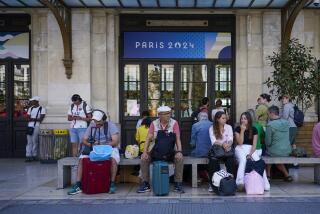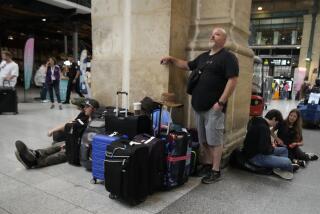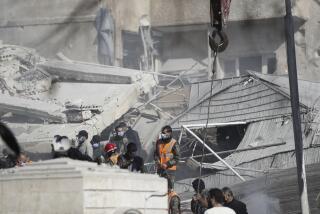Terrorist Bomb in Paris Subway Kills 4; 62 Hurt
PARIS — A powerful bomb ripped through an underground train as it entered a station near Notre Dame Cathedral on Tuesday, killing four rush-hour passengers and wounding 62 others in a blast so intense that it tore the limbs from some victims.
The brutal attack, for which there was no immediate claim of responsibility, turned the usually carefree Latin Quarter on Paris’ Left Bank into a grisly scene resembling a war zone. Two sidewalk cafes near the Seine River became makeshift hospitals for treating the wounded, whose clothes were smeared with their blood and that of other victims.
As the warm, sunny day drew to a close, helicopters darted to and from the cobbled esplanade in front of Notre Dame to airlift the injured to hospitals. Firefighters, police officers and medical rescue workers, a total of 500 men and women carried by vehicles with shrieking sirens and flashing lights, poured down the stairs of the Saint-Michel station of the Paris regional rapid rail-service line, where many of the wounded lay.
On the station platform, some of the most critically injured had limbs hastily amputated by doctors, officials said. “It was nearly like wartime surgery,” said Col. Alain Michel of the Paris fire brigade.
Jean-Baptiste Balaste, an office worker, was standing on the platform after a day’s work waiting to board the ill-fated train bound for the southern suburbs of Paris when the blast occurred. “It was terrible,” he recalled. “People were screaming all over the place. Young people were jumping out of the windows.”
Balaste said he survived because the explosion shoved him into the station’s wall. “I first started running away, because I was afraid there might be another explosion. But when I heard the cries and the sighs coming from inside [the train], I went back, because I realized people needed help.”
The terrorist incident was the first of its kind in the French capital since conservative Jacques Chirac won the presidential election in May, ending 14 years of Socialist rule. Since taking office, Chirac has espoused a high-profile foreign policy that has aroused hostility for some of its elements, including France’s decision to renew nuclear weapons tests in the South Pacific and Chirac’s advocacy of a more vigorous use of military force to protect U.N.-declared “safe areas” in Bosnia-Herzegovina.
Because of those new policies, and old enmities aroused by France, analysts conjectured that Tuesday’s bombing, said to be the first in Paris for eight years, could be the work of any one of a number of groups--including the Bosnian Serbs, Islamic fundamentalists from Algeria and Palestinian hard-liners opposed to the Palestine Liberation Organization’s negotiations with Israel.
But no matter who was behind the attack, fears were widespread in France that it could herald a series of terrorist bombings in the capital like those in 1986-87, blamed on pro-Iranian Lebanese, in which 13 people died and 303 were wounded.
On Tuesday evening, Interior Minister Jean-Louis Debre ordered “total mobilization” of the Paris police and stepped-up security at airports, government buildings and monuments and in public transportation. “All the measures that are necessary so that this will not happen again will be taken,” Debre vowed.
According to officials and witnesses, the bomb exploded in the sixth car of an eight-car double-decker train on the French capital’s regional high-speed rail line, the RER, as it rolled through central Paris to the southern suburb of Saint-Remy-les-Chevreuse.
The RER train, which runs on a line that is separate from those of the older Paris Metro, was entering the Saint-Michel station when the bomb exploded shortly after 5:30 p.m.
Four passengers, three of them women, were killed, said Lt. Col. Jean-Luc Maresq, spokesman for the Paris fire brigade. Many other people aboard the train or waiting on the station platform had their faces cut by flying glass from the windows, which the bomb shattered.
“Objects were thrown against people: seats, handbags or whatever the passengers were carrying,” Maresq said. The explosion blew down internal partitions in the rail car and expanded the roof like a souffle.
“The intention to kill was evident,” said a visibly shaken Prime Minister Alain Juppe, who like Chirac and other top government officials visited the site after the explosion. Juppe refused to speculate about who might be behind the attack but denounced it as “abominable carnage.”
Agence France-Presse, the French news service, quoted a “well-informed source” as saying the bomb had contained several pounds of high explosives but that police investigators hadn’t yet identified the precise substance.
The bomber, the source said, probably left the explosives in the train and got off at Chatelet, the busy station on the northern side of the river before Saint-Michel. France-Info, a Paris-based radio station, said the charge was apparently detonated with a timer.
As night fell, police detectives and two special counterterrorism investigators from the Paris prosecutor’s office were poring over the blast site, scraping the walls of the bombed-out train car in the hope that the residue would show what sort of explosive was used and provide clues to who was responsible.
The attack occurred as offices and stores in the Latin Quarter were emptying for the day and appeared to have been timed to claim the maximum number of victims. The neighborhood on the South Bank of the Seine, a center of French student and cultural life since the Middle Ages, is highly popular with foreign tourists.
Despite the large summer influx of foreigners into Paris, officials of the regional transport authority said the RER train was less crowded than it would have been at other times of the year because many Parisians are now on summer vacation.
Fourteen people were critically injured in the attack, while 48 others were being treated for less serious wounds, officials told French media Tuesday night. Several people suffered burns from a fire that broke out on the damaged train car but that firefighters managed to extinguish. Other victims sustained lung injuries blamed on the bomb’s concussion, which was powerful enough to twist metalwork inside the car.
At the Cafe St. Severin near the RER station, paramedics treated 10 of the injured while waiters handed out water to shocked commuters.
“Everybody was stunned--all the people from the train,” one bartender recalled. “Three quarters of them didn’t remember where they lived.”
Times staff writer Dahlburg reported from Le Castellet and White of The Times’ Paris Bureau from Paris.
More to Read
Sign up for Essential California
The most important California stories and recommendations in your inbox every morning.
You may occasionally receive promotional content from the Los Angeles Times.










